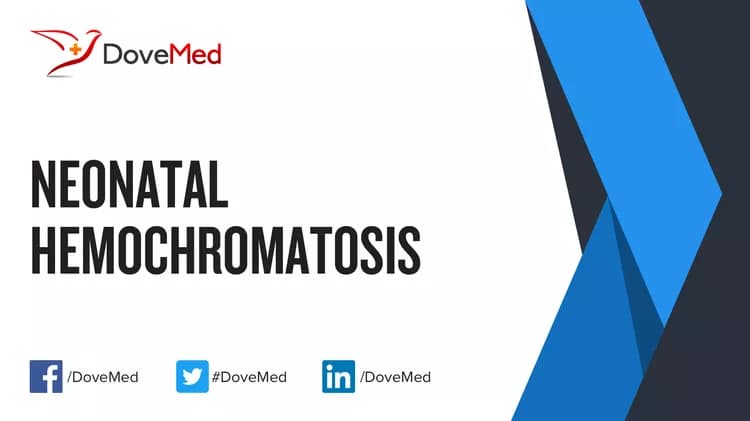What are the other Names for this Condition? (Also known as/Synonyms)
- Idiopathic Neonatal Hemochromatosis
- NH (Neonatal Hemochromatosis)
- NHC (Neonatal Hemochromatosis)
What is Neonatal Hemochromatosis? (Definition/Background Information)
- Neonatal Hemochromatosis (NH) is a disease in which too much iron builds up in the body. This is also called iron overload. Accumulation of iron in the organs is toxic and can cause organ damage. In this form of hemochromatosis, the iron overload begins before birth
- This disease tends to progress rapidly and is characterized by liver damage that is apparent at birth or in the first days of life
- Babies with the disease may be born very early (premature) or struggle to grow in the womb (intrauterine growth restriction)
- Symptoms of neonatal hemochromatosis may include low blood sugar (hypoglycemia), abnormalities in blood clotting, yellowing of the skin and eyes (jaundice), and swelling (edema)
- The exact cause of Neonatal Hemochromatosis is unknown. It is thought that the disease may be caused by a pregnant woman’s immune system recognizing cells of the baby’s liver as foreign. If a woman had a baby with Neonatal Hemochromatosis, each future child has an 80% chance to have the disease as well
- Treatment options may include blood exchange transfusion, intravenous immunoglobulin (IVIG) therapy, and liver transplant
(Source: Neonatal Hemochromatosis; Genetic and Rare Diseases Information Center (GARD) of National Center for Advancing Translational Sciences (NCATS), USA.)
Who gets Neonatal Hemochromatosis? (Age and Sex Distribution)
- Neonatal Hemochromatosis is a rare, congenital disorder. The presentation of symptoms may occur prior to or at birth
- Both males and females may be affected
- Worldwide, individuals of all racial and ethnic groups may be affected
What are the Risk Factors for Neonatal Hemochromatosis? (Predisposing Factors)
- Currently, no risk factors have been clearly identified for Neonatal Hemochromatosis
It is important to note that having a risk factor does not mean that one will get the condition. A risk factor increases one’s chances of getting a condition compared to an individual without the risk factors. Some risk factors are more important than others.
Also, not having a risk factor does not mean that an individual will not get the condition. It is always important to discuss the effect of risk factors with your healthcare provider.
What are the Causes of Neonatal Hemochromatosis? (Etiology)
The exact cause of Neonatal Hemochromatosis: is not known at the present time.
- It has been suggested that an aberrant immune function in a pregnant mother targets a developing fetus’s liver cells, rendering the liver incapable of absorbing iron properly
- The unabsorbed excess iron gets deposited elsewhere in the body, causing the condition
What are the Signs and Symptoms of Neonatal Hemochromatosis?
The signs and symptoms of Neonatal Hemochromatosis may vary in type and severity among those affected, and may include:
- Abnormal bleeding
- Cholestasis
- Cirrhosis
- Congenital onset
- Hepatic fibrosis
- Hepatocellular necrosis
- Intrauterine growth retardation
- Nonimmune hydrops fetalis
- Oligohydramnios
Based on the frequency of symptoms observed, the following information may be noted:
Very frequently present symptoms in 80-99% of the cases:
- Abnormal localization of kidney
- Anteverted nares
- Aplasia/Hypoplasia of the nipples
- Blepharophimosis
- Congenital hepatic fibrosis
- Hypoglycemia
- Increased serum ferritin
- Increased serum iron
- Micrognathia
- Prolonged neonatal jaundice
- Prominent nose
(Source: Neonatal Hemochromatosis; Genetic and Rare Diseases Information Center (GARD) of National Center for Advancing Translational Sciences (NCATS), USA.)
How is Neonatal Hemochromatosis Diagnosed?
Neonatal Hemochromatosis is diagnosed on the basis of the following information:
- Complete physical examination
- Thorough medical history evaluation
- Assessment of signs and symptoms
- Laboratory tests, including measurement of transaminase activity
- Imaging studies
- Biopsy of tissue from salivary glands, liver and pancreas to check for iron overload
Many clinical conditions may have similar signs and symptoms. Your healthcare provider may perform additional tests to rule out other clinical conditions to arrive at a definitive diagnosis.
What are the possible Complications of Neonatal Hemochromatosis?
The complications of Neonatal Hemochromatosis may include:
- Progressive worsening of the condition, leading to hepatic failure
- Complications from liver damage
Complications may occur with or without treatment, and in some cases, due to treatment also.
How is Neonatal Hemochromatosis Treated?
There is no cure for Neonatal Hemochromatosis, since it is a congenital disorder. The treatment is usually given to manage the signs and symptoms and any complication that develops. Such methods may include:
- Blood exchange transfusion
- Intravenous immunoglobulin (IVIG) therapy
How can Neonatal Hemochromatosis be Prevented?
- If a woman has carried a baby with Neonatal Hemochromatosis, intravenous immunoglobulin treatment in subsequent pregnancies may minimize the likelihood of the condition occurring, or its severity in the baby
- Active research is currently being performed to explore the possibilities for treatment and prevention of inherited and acquired genetic disorders
Regular medical screening at periodic intervals with tests and physical examinations are recommended.
What is the Prognosis of Neonatal Hemochromatosis? (Outcomes/Resolutions)
The prognosis of Neonatal Hemochromatosis is generally poor, with treatments often remaining unsuccessful.
Additional and Relevant Useful Information for Neonatal Hemochromatosis:
Neonatal Hemochromatosis was formerly known by the following synonyms:
- Giant Cell Hepatitis
- Neonatal Hepatitis
The following DoveMed website link is a useful resource for additional information:
Related Articles
Test Your Knowledge
Asked by users
Related Centers
Related Specialties
Related Physicians
Related Procedures
Related Resources
Join DoveHubs
and connect with fellow professionals


0 Comments
Please log in to post a comment.